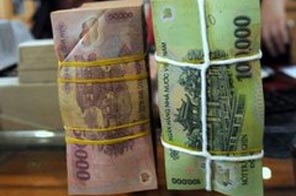Vietnam devalues dong for second time in 3 months
HANOI: Vietnam's central bank devalued the dong for the second time in three months on Thursday amid widespread concerns over a high trade deficit and inflation.
The average interbank rate on Thursday was 18,544 dong per US dollar, against 17,941 the previous day, a fall of 3.4 percent, the State Bank of Vietnam (SBV) said.
It said the decision was taken to balance supply and demand, and increase flows in the foreign exchange market "while contributing to controlling the trade deficit and stabilising the macroeconomy".
Vietnam's trade deficit reached 12.2 billion dollars last year.
The central bank maintained the 3.0 percent daily trading band for buying and selling US dollars by commercial banks.
Because the band remains unchanged there was no official devaluation, a banker said, but in practice the new interbank rate means the dong loses value, "so we can say it's a devaluation".
Devaluation coupled with lower interest rates aims to encourage businesses to sell dollars to banks, said the banker, who declined to be named.
"This (interbank) rate might be maintained in the next few months in order for the state to control the trade deficit," she said.
Vietnam's trade suffered during last year's global financial crisis.
In November the central bank effectively devalued the dong by 5.4 percent and reduced the trading band from 5.0 percent.
Hanoi also late last year ordered companies to sell United States dollars to state banks, after months of official intervention to prop up the local unit.
Singapore-based DBS Group Research said Thursday's move should not be seen as a surprise and is likely to be followed by more devaluation during the year.
"Under the circumstances, we remain comfortable with our end-2010 target of 19,640," DBS said.
Phan Chi Thanh, a senior official in the Office of the Government, said late last month that authorities will gradually tighten monetary policy.
Vietnam's economy grew 5.32 percent last year but that expansion came with a budget deficit that official data said reached seven percent of gross domestic product.
Observers have expressed concern about a return to soaring prices that pushed inflation to an annual 23 percent in 2008.
Vietnam beat its annual inflation target of seven percent in 2009, according to official figures, despite signs that prices increased more at the end of the year due to a stimulus package aimed at fighting the global downturn.
Consumer prices rose 7.62 percent year-on-year in January, higher than the government's 2010 target of below seven percent, official figures showed.
The latest devaluation came during a period of high demand for cash before a week-long Lunar New Year holiday.
In its order on Thursday, the SBV also set the maximum interest rate for corporate dollar saving accounts at a maximum of 1.0 percent, less than lenders had been offering.






